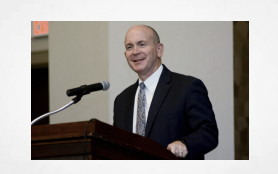Elon University School of Law promoted its longest-serving administrator and faculty member to a role overseeing its new flex program in Charlotte.
Alan Woodlief Jr. will supervise the Elon Law Flex Program as vice dean.
The part-time, in-person program will have its inaugural class in August. Woodlief will remain based in Greensboro, where Elon’s established law school exists, and continue oversight of Elon Law’s existing budget and operations.
He’ll coordinate with colleagues in academic affairs, admissions and the library to support Charlotte’s program.
“I am excited for this new opportunity to grow Elon Law’s presence in Charlotte and our national reputation for experiential learning and mentoring relationships as we empower a select group of professionals to realize their dreams of becoming lawyers,” Woodlief said in a release.
Woodlief joined Elon Law in May 2005 to prepare facilities and curriculum for the arrival of the law school’s charter class the following year. He has chaired or served on numerous law school and university committees, including strategic planning and American Bar Association accreditation committees.
Elon Law has graduated more than 1,500 alumni since opening in 2006. Its annual enrollment now tops 440 students. Students there finish a law degree in two-and-a-half years, rather than the traditional three years at most schools.
The program in Charlotte will offer classes at night to start and will take four years to complete. It is geared toward people with jobs or other responsibilities who want to earn a law degree. The school expects about 35 students in its first class.
Woodlief established Elon Law’s Moot Court Program in 2008. In 2015, he founded the Guardian Ad Litem Appellate Advocacy Clinic, through which Elon Law students represent the interests of abused and neglected children in state appellate courts. Woodlief will lead those programs and teach at both Greensboro and Charlotte campuses.
Woodlief earned his law degree from Campbell University in 1994 after a bachelor’s at UNC Chapel Hill. Woodlief’s expertise is in damages, civil trial practice and appellate practice, and he has authored treatises that are used by North Carolina practitioners and judges and frequently cited by the state’s appellate courts.
“This promotion to vice dean is a recognition of Alan’s leadership over the history of Elon Law, as well as an updated portfolio that matches the School of Law’s changing needs,” said Dean Zak Kramer. “Our ongoing success simply would not be possible without his valuable service to Elon University.”
Charlotte has not had a law school since the private Charlotte School of Law closed in 2017, a year after the American Bar Association put it on probation amid questions of over adherence to admission standards and federal student aid laws.
The North Carolina Central University’s School of Law is the only law school in the state to offer a part-time schedule with approval from the American Bar Association.
Elon’s law school in Charlotte will cost the same as in Greensboro, where total tuition for the two-plus years is approximately $125,000, which does not include living expenses. Annual tuition is more than $50,000, although almost all Elon law students receive some type of financial aid.





